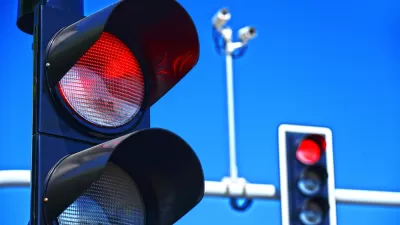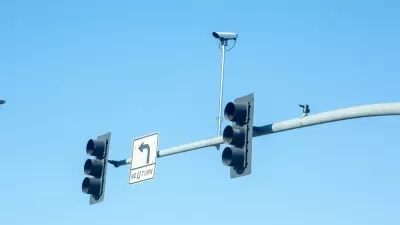Milwaukee wants Wisconsin to overturn its law that prohibits red light cameras throughout the states. New state legislation could help achieve the city's goal.

"The city of Milwaukee wants state law changed to allow red light cameras and speed enforcement cameras installed at the most dangerous intersections in the city," reports Corri Hess.
According to Hess, there is already draft legislation in the works that would "allow law enforcement agencies in Milwaukee to photograph vehicles going through a red light and those speeding more than 21 miles per hour."
"Danielle Decker, a lobbyist for the city of Milwaukee, said if the Legislature were to approve the bill, the city would start a five-year pilot of the cameras at about 50 intersections," according to Hess.
The article sets the political debate over red lights in Wisconsin (where it's illegal throughout the state to install cameras at intersections) in context of debates in other cities and states, headlined most recently by a law signed in Texas to outlaw the cameras.
Hess also notes a 2017 study by Case Western Reserve University researchers [pdf] that "found red light cameras changed the types of accidents occurring, but not the frequency of accidents or injuries." Unmentioned is a more recent analysis that finds pedestrian fatalities increase after red light cameras are removed.
FULL STORY: Bill Allows Red Light Cameras in City

Planetizen Federal Action Tracker
A weekly monitor of how Trump’s orders and actions are impacting planners and planning in America.

Maui's Vacation Rental Debate Turns Ugly
Verbal attacks, misinformation campaigns and fistfights plague a high-stakes debate to convert thousands of vacation rentals into long-term housing.

Restaurant Patios Were a Pandemic Win — Why Were They so Hard to Keep?
Social distancing requirements and changes in travel patterns prompted cities to pilot new uses for street and sidewalk space. Then it got complicated.

In California Battle of Housing vs. Environment, Housing Just Won
A new state law significantly limits the power of CEQA, an environmental review law that served as a powerful tool for blocking new development.

Boulder Eliminates Parking Minimums Citywide
Officials estimate the cost of building a single underground parking space at up to $100,000.

Orange County, Florida Adopts Largest US “Sprawl Repair” Code
The ‘Orange Code’ seeks to rectify decades of sprawl-inducing, car-oriented development.
Urban Design for Planners 1: Software Tools
This six-course series explores essential urban design concepts using open source software and equips planners with the tools they need to participate fully in the urban design process.
Planning for Universal Design
Learn the tools for implementing Universal Design in planning regulations.
Heyer Gruel & Associates PA
JM Goldson LLC
Custer County Colorado
City of Camden Redevelopment Agency
City of Astoria
Transportation Research & Education Center (TREC) at Portland State University
Jefferson Parish Government
Camden Redevelopment Agency
City of Claremont




























